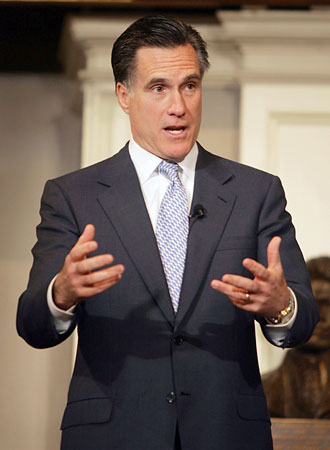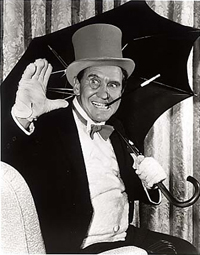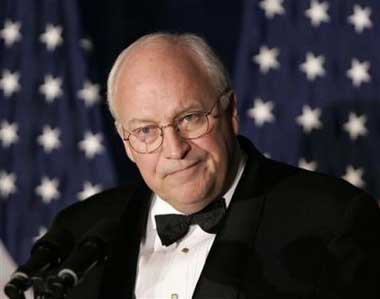There's been considerable hype about Romney's speech yesterday and over whether it was successful. The speech, entitled with a not-so-clever pun, "Faith in America," was billed as the "JFK Speech" where Romney would finally address his religion the way JFK did in the 60s by reassuring WASPS that he wouldn't turn America into a Papal State. But there are differences between JFK and Romney and their respective situations that make the comparison a bit misleading.
First, Kennedy and Romney are addressing different audiences. Kennedy gave his speech weeks before the general election and was speaking to America as a whole.
Romney's audience is a bit more complicated. His speech was given weeks before the primaries begin, and is addressed to GOP voters---specifically, GOP voters in Iowa. On the other hand, it was also nationally televised and predictably pounced on by the national punditry, so he had a bigger indirect audience.
Secondly, Kennedy and Romney are addressing different concerns. This is partially a function of the first difference. With Kennedy the fear was that he would answer to the Pope. This was relatively easy to disarm. He simply disavowed that he would make Rome a decision-maker. With Romney also, some fear that he will answer to Salt Lake, but for most, there is also the more amorphous fear is that he is not truly Christian, and that he is part of a weird cult. This seems to matter to GOP voters in Iowa (hence, Huckabee's success). This is harder to disarm. He could just disavow Mormonism, but that's not really an option if he has any devotion or integrity. So he has to either (1) make Mormonism acceptable to the Christian conservatives in the heartland, or (2) convince them that Mormonism doesn't matter.
To evaluate whether Romney was successful, we need to have answer three questions:
- what exactly was his goal in giving the speech?
- how well did he achieve that goal? and
- are there unintended consequences that undermine that achievement?
I.Romney's goal, it seems to me, is simply to convince voters that the fact that he is a Mormon is not a valid reason to vote against him. Some of the TV pundits suggested last night that his purpose in giving the speech was to "address his Mormonism" as though he intended to give an exposition of the faith, and criticized him for not doing so. That approach misunderstands the concerns Romney is trying to address and the viability of the different ways to address them. They seem to assume that Romney would have attempted to make Mormonism seem palatable and rational to evangelical Christians. That is probably not possible at all, and certainly not possible in the available forum. His goal cannot be to make Mormonism acceptable, and his faith and integrity do not allow him to disavow it, so the only reasonable goal is to articulate convincingly why Mormonism simply does not matter.
II.So did he do it? Did he convincingly articulate why it should not matter to GOP voters in the heartland (mostly evangelical Christians) that he is a Mormon? I say yes, he did about the best job anyone could do. However, the question that remains is whether the evangelical Christian GOP voters will buy it.
He spends a lot of the speech doing the normal flag waving and laudatory patriotism, and makes the requisite hagiographic references to the so-called greatest generation, and the founding fathers, but there is a section early in the middle of the speech where he really gets into the meat of addressing his goal.
"They would prefer it if I would simply distance myself from my religion, say that it is more a tradition than my personal conviction, or disavow one or another of its precepts. That I will not do. I believe in my Mormon faith and I endeavor to live by it. My faith is the faith of my fathers - I will be true to them and to my beliefs.
Some believe that such a confession of my faith will sink my candidacy. If they are right, so be it. But I think they underestimate the American people. Americans do not respect believers of convenience. Americans tire of those who would jettison their beliefs, even to gain the world."
A couple of strengths to note here. First, he makes his religious commitment clear. This is an improvement over the past where he has sometimes seemed uncomfortable about his religion. Building integrity is almost always helpful. Second, he makes a nice rhetorical move in heading off those who wish he would not be committed to Mormonism. With the "they underestimate the American People" phrase he is not only praising the goodness and greatness of Americans' religious tolerance, he is also implicitly saying that if you don't agree to be tolerant, you don't live up to being a real American. I thought this was effective.
He then goes on to elaborate on the American virtue of religious tolerance. Specifically, he expands its application, and challenges those who don't think tolerance extends to accepting cultish religions.
"Each religion has its own unique doctrines and history. These are not bases for criticism but rather a test of our tolerance. Religious tolerance would be a shallow principle indeed if it were reserved only for faiths with which we agree."
Framing his Mormonism as a test of the tolerance (and therefore the American-ness) of his critics was a well-played rhetorical move. And then he articulated a constitutional standard to back up the tradition of religious tolerance he had already alluded to:
"There are some who would have a presidential candidate describe and explain his church's distinctive doctrines. To do so would enable the very religious test the founders prohibited in the Constitution."
This has the virtue of grounding tradition in text, for any legalistically minded listeners. The appeal of a text is also important to evangelicals who subscribe to "sola scriptura" inerrancy. It also has the added bonus of an appeal to the founders, which is always an important trope in political rhetoric, and one that is particularly useful with GOP voters who tend to be originalists.
Then he illustrated the principle of religious tolerance with this nice little "it's-a-small-world-after-all" survey of religions.
"And in every faith I have come to know, there are features I wish were in my own: I love the profound ceremony of the Catholic Mass, the approachability of God in the prayers of the Evangelicals, the tenderness of spirit among the Pentecostals, the confident independence of the Lutherans, the ancient traditions of the Jews, unchanged through the ages, and the commitment to frequent prayer of the Muslims."
But you can't tell evangelical GOP voters that faith doesn't matter altogether. So after tearing down the notion that a candidate's subscription to evangelical Christianity should be some kind of litmus test, he then had to build some kind of shared faith to stand in it's place. He did so by appealing to the "shared values" trope.
"These American values, this great moral heritage, is shared and lived in my religion as it is in yours. I was taught in my home to honor God and love my neighbor. I saw my father march with Martin Luther King. I saw my parents provide compassionate care to others, in personal ways to people nearby, and in just as consequential ways in leading national volunteer movements. I am moved by the Lord's words: 'For I was an hungered, and ye gave me meat: I was thirsty, and ye gave me drink: I was a stranger, and ye took me in: naked, and ye clothed me...'"
The shared values idea has a long and venerable history in the GOP that extends from the time that protestant denominations banded together to fight the "twin relics of barbarism" to the time they now welcome Catholics in their crusade against gay marriage and abortion rights.
While I might quibble with Romney's choice of words in a few places, overall I think he did a good job. He was articulate, smart, laudatory, and (unsurprisingly) polished. Whether the audience bought it is something that will have to be determined by upcoming polls, but I think he stated the case as compellingly as anyone could have.
III.Are there unintended consequences? A few possibilities come to mind. First, while Romney did mention the venerability of the separation of church and state, he also spent most of the speech extolling religious virtues and asserting their place in the public sphere. This could alienate any potential atheists or agnostics. However, remembering Romney's audience, this is not a surprising choice. Secularists on the whole tend to be the sort that would be unlikely to vote for Romney even if he were an atheist himself simply because of his politics, so he has very little to gain by accommodating them, and potentially much to lose.
Second, quoting Matthew 25:35 and alluding his father marching with Martin Luther King is a great appeal to the social conscience. But the social conscience is generally (though not exclusively) a thing of the left in this country. This is not to say that Republicans can't appreciate civil rights, only that Romney saying these things almost makes him sound like a democrat. This could remind some GOP hardliners of his father's embarrassing (to them) opposition to the Vietnam War. But he also worked in the religious angle to the social conscience, which is going to be hard for Christians to deny. It may also help him with the more moderate national audience that may have tuned in.
The bottom line: I think it was a good speech---way better than the admittedly low standard the current President has set. And while I still have policy concerns about Romney, it is nice to see him stand up to the religiously intolerant wing of the GOP and call them on the un-American-ness and hypocrisy of that attitude. I wonder if this is what he would be like all the time if were being his own moderate self rather than trying so hard to be a conservative. After all, this is a guy who won an election in Mass.

























